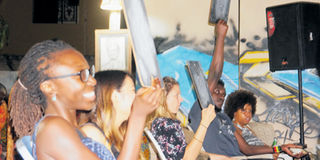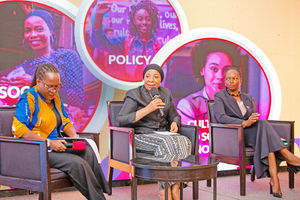Poetry slam finally makes its way to Tanzania

A jury of five people rates the performances of each participant.
PHOTOI ANDREW STEPHEN.
What you need to know:
- Driving force behind the event is Loyce Gayo, the daughter of the cartoonist James Gayo.
It was a premier for Tanzania. For the very first time a slam poetry event took place in Dar es Salaam on Tuesday. Being an art form that is well-known in other parts of the world, it took up to this day to introduce poetry slam in the cultural scene of Tanzania. Driving force behind the event is Loyce Gayo, the daughter of the cartoonist James Gayo.
On Tuesday night, this 22-year-old woman stands on the rooftop of the Eco Sanaa Terrace in Mikocheni and beams all over her face.
“I can’t believe that it took so long – we finally made it,” she says. Ms Gayo left Tanzania ten years ago for Texas and established herself as a successful slam poet in the United States. Last month she came back to Dar es Salaam for half a year with a clear objective: spreading the slam poetry culture in Tanzania.
On this particular night, Ms Gayo limits herself to presenting the event. In the centre of interest are the seven courageous participants that dabble themselves in poetry slam. They are aged between 20 and 35. Only one man figures in the competing field. One after the other will go up on stage and perform the poem that he or she has prepared.
The goal is to convince the five judges that rate the performances. But not only them; it is an integral part of the poetry slam culture that the audience makes its voice heard as well. By clapping, shouting and cheering, it tries to influence the ratings of the jury. When the event starts at 7.30 there are about 30 people attending. In the course of the night more will arrive, up to about 45.
Portraying life issues
Ms Gayo cannot really offer an explanation why it took so long to launch poetry slam in Tanzania while in South Africa or Kenya it has been popular for quite some time. It is in some way surprising, she says, because Tanzania has always had a rich culture of oral representation. She mentions the lively poetry scene in Dar es Salaam, the open Mic events or the vivid music environment. “The culture of poetry slam has always been there,” she says.
It doesn’t come as a surprise then, that several participants of the event belong to the poetry scene of Dar es Salaam who meet regularly at Soma book café. On stage, they talk about the big issues of life: love, death, relationships, family, sexism and friendships. A female participant named her poem “From the womb” and recites: “Please papa, even if you hate mama now, stay cause I am on my way.” Another woman raises doubts about the pretentious self-representation on social media, another one expresses her frustrations about the role model female celebrities sends out. And of course, carpe diem: “When death approaches, you will regret the things you haven’t done instead of the things you have done,” a competitor cites. “Leave a legacy, don’t live nameless,” another one says.
Tuesday’s competition is not an isolated event, but only a puzzle piece in a much bigger picture. Ms Gayo is the founder and co-director of Paza Sauti, a programme that promotes creative writing and performing arts among young people. The first poetry slam that night should be the start to a thriving poetry slam scene in Tanzania.
For Ms Gayo performing arts can play an important role in enhancing the civic engagement of the people.
“The goal of Paza Sauti is enabling young people to talk about important social issues and thereby improving the life in their communities,” she says. The initiative targets children from 6 to 18 years. Ms Gayo and other artists would go to schools and motivate young people not only for creative writing but also for reciting it. Up to now they have reached about 400 children in schools, Ms Gayo says. She expresses excitement about the capacity of young people to perceive the world.
Raising your voice
“The writing of these young people is phenomenal,” she says. “They are able to talk about serious issues such as income inequality, racism and environmental justice.” With Paza Sauti, which is Swahili for raise your voice, Ms Gayo wants to make sure that the youth will keep raising their concerns when they grow older. The ultimate goal is to create leaders that are braver, more honest, more analytical and more sceptical than today’s people in charge,” she says.
The first round has ended. Every one of the seven participants has performed one poem by that time. The next round is yet to come. Some of them will read the text from their cell phones, others recite by heart. Some of them appear somewhat uneasy on stage, limiting themselves to the minimum of moves, others behave naturally, using gestures and facial expressions to stress their point. Two of the competitors even add melodies to their recitations.
Youth poetry festival
The event in Mikocheni is not a goal in itself but serves as a fundraiser for the Dar Youth Poetry Festival in Dar es Salaam, which will take place next weekend. The two-day event will feature poetry by accomplished poets from across East Africa and the United States, but above all, will give young artists between 6 and 18 years the chance to participate in workshops to develop their writing and performing skills. Finally, Paza Sauti aims to send five Tanzanian children to the International Youth Poetry Slam Festival “Brave New Voices” next year in Chicago; in the city where poetry slam was born.
The longer the evening goes, the better the scores the performers get. It is not immediately clear if the participants have really improved or if the judges became milder in their judgements under the pressure of the audience.
Lower scores are often booed by the public, whereas the top score of ten points are acclaimed. After the second round, there is a break for the participants. Then the Tanzanian poet Zuhura takes over. She will be the first one that recites a poem in Swahili, a love poem.
“There are no restrictions when it comes to language,” Ms Gayo explains. “As long as it resonates with the public, everything is fine.” It’s paramount for Ms Gayo that the barriers for artistic engagement are set as low as possible. It is also there where she sees a big virtue in poetry slam. “It is true that poetry itself can be somewhat discouraging at the beginning,” she says. Poetry slam, however, she considers much more accessible because neither spelling nor rhymes nor sentence structure really matter. She is convinced that performing is something very natural.
“When I go to classes, I can see that many children naturally use their body language and automatically use the right words to address the public,” she says.
In the meantime, four participants have been eliminated from the competition. The three remaining artists perform their last poem. It is their third. Two artists finally emerge winners. It is Carol Anande and Jasper Kido, how they are called by their stage names.
“I feel honoured that the audience liked my poems,” Carol Anande says after the event. She has experience in public appearances, but a poetry slam is different, she says. “It is in particular new to me to receive a direct feedback not only by judges but also by the public.” Jasper Kido says, it felt good to participate in the poetry slam.
He too has been a poet for some time, but says the combative nature of the slam is especially appealing to him, because he is competitive and a perfectionist. Both winners express optimism that poetry slam will take root in Tanzania. “We’ve been discussing it for quite some time”, Jasper Kido says. “I am super happy that it has come to life now.”
Email: [email protected]




